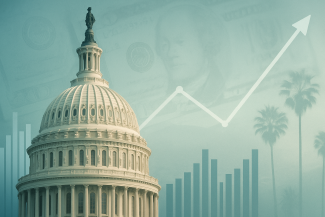
Key Tax Reforms in the New Budget Bill and How They Could Affect You
Budget Bill Brings Major Tax Changes—and Uncertainty
With the passing of the budget bill and the President’s signature, significant changes are coming to the U.S. budget and economy some noticeable, some not.
For residents of California, one major impact is the increase in the SALT deduction (State and Local Tax deduction). Previously capped at $10,000, it will rise to $40,000 for couples earning under $500,000. This increase, however, expires at the end of 2029.
For broader context and analysis, check out this Wall Street Journal article on personal tax changes.
Markets React Calmly—So Far
As for the economic impact, markets are largely shrugging off the legislation for now. A significant piece of the bill extends the tax cuts from the 2017 Tax Cuts and Jobs Act, originally passed during Trump’s first term.
These provisions—lower marginal rates, the qualified business deduction, and a higher standard deduction—were initially slated to expire after 10 years. While contributing substantially to the federal debt, many individuals might barely notice the permanency of these lower rates day-to-day.
Meanwhile, the Federal Reserve still appears focused on cutting interest rates this year—potentially up to two times. However, strong labor market data last week caused markets to delay expectations for lower rates.
Trade Tensions Simmer
The so-called “TACO trade” (Trump Always Chickens Out) seems to be intact, as the imposition of additional tariffs was delayed from this week to August 1. Markets appear increasingly skeptical of any firm deadlines on trade negotiations.
Inflation and Interest Rates
Interest rates for maturities longer than one year have been climbing this month, reflecting lingering market concerns about inflation.
While there’s been minimal discussion of recession among analysts and the press, it’s worth noting that GDP growth for the first quarter was slightly negative at -0.05%. The black swan event for this year or early next could indeed be a recession.
For thoughts on preparing for market volatility, read our post on investing strategies during market downturns.
Key Tax Changes from the Budget Bill
Highlights from the Tax Foundation analysis include:
- Individual Tax Changes
- Permanent lower rates for the 10%, 12%, and 22% brackets.
- Permanent increase to the standard deduction starting in 2025 ($31,500 for joint filers).
- New senior deduction of $6,000 (2025–2028) with income phaseouts.
- Increased Child Tax Credit to $2,200 starting in 2026.
- Permanent $750,000 mortgage interest deduction limit.
- Temporary SALT deduction cap increases to $40,000 through 2029, then reverting to $10,000.
- AMT exemption increases remain permanent.
- Several deductions limited or repealed, including miscellaneous itemized deductions and certain green energy credits.
- Temporary deductions for tip income, overtime premiums, and auto loan interest for U.S.-assembled vehicles (2025–2028).
- My American Growth Account (MAGA): A new tax-advantaged custodial savings accounts for children under age 8, allowing up to $5,000/year in after-tax contributions to grow tax-free. Funds become accessible in phases starting at age 18 and can be used for broad life expenses (not limited to education), with a $1,000 federal seed deposit for eligible children—ideal for families who have already funded 529 plans or who want flexible, long-term savings beyond earned income limits of Roth IRAs.
- Estate Tax Changes
- Permanently raises the estate and lifetime gift tax exemption to $15 million for single filers and $30 million for joint filers starting in 2026.
- Business Tax Provisions
- Permanently allows immediate expensing for domestic R&D.
- 100% bonus depreciation restored for short-lived investments.
- Section 199A pass-through deduction made permanent with expanded thresholds.
- Some green energy credits eliminated or modified, particularly for foreign-entity-related projects.
- International Tax Changes
- GILTI renamed Net CFC Tested Income (NCTI), taxed at 12.6–14%.
- FDII renamed Foreign-Derived Deduction Eligible Income (FDDEI), taxed at 14%.
- BEAT rate raised to 10.5%.
For additional tax changes impacting individuals and businesses, visit our update on 2025 tax law updates.
Economic Outlook
The Tax Foundation estimates the bill would lower marginal tax rates on work, saving, and investment, potentially expanding the economy by 1.2% over the long term. The capital stock could grow by 0.7%, and pre-tax wages might increase 0.4%. However, the legislation is projected to add $3.8 trillion to federal deficits over the next decade.
By 2034, the debt-to-GDP ratio could rise to 126.7% (from 117.1% without the bill). In the long run, that ratio might reach 175.5% on a dynamic basis under the proposed budget.
Bottom Line: There’s a lot to unpack in the new budget legislation. While many provisions could offer immediate tax relief or business incentives, long-term effects on the national debt and potential recession risks remain significant concerns.
This website is informational only and does not constitute investment advice or a solicitation. Investments and investment strategies recommended in this blog may not be suitable for all investors. SAS Financial Advisors, LLC and its members may hold positions in the securities mentioned within this newsletter. SAS Financial Advisors, LLC is not responsible for any third-party content referenced.

